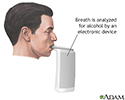Breath alcohol test
Alcohol test - breathA breath alcohol test determines how much alcohol is in your blood. The test measures the amount of alcohol in the air you breathe out (exhale).
How the Test is Performed
There are many brands of breath alcohol tests. Each one uses a different method to test the level of alcohol in the breath. The machine may be electronic or manual.
One common tester is the balloon type. You blow up the balloon with one breath until it is full. You then release the air into a glass tube. The tube is filled with bands of yellow crystals. The bands in the tube change colors (from yellow to green), depending on the alcohol content. Carefully read the instructions before using the test to make sure you get an accurate result.
If an electronic alcohol meter is used, follow the instructions that come with the meter.
How to Prepare for the Test
Wait 15 minutes after drinking an alcoholic beverage and 1 minute after smoking before starting the test.
How the Test will Feel
There is no discomfort.
Why the Test is Performed
When you drink alcohol, the amount of alcohol in your blood goes up. This is called your blood-alcohol level.
When the amount of alcohol in the blood reaches 0.02% to 0.03%, you may feel a relaxing "high."
When that percentage reaches 0.05% to 0.10%, you have:
- Reduced muscle coordination
- A longer reaction time
- Impaired judgment and responses
Driving and operating machinery when you're "high" or drunk (intoxicated) is dangerous. A person with an alcohol level of 0.08% and above is considered legally drunk in most states. (Some states have lower levels than others.)
The alcohol content of exhaled air accurately reflects the alcohol content of the blood.
Normal Results
Normal is when the blood alcohol level is zero.
What Abnormal Results Mean
With the balloon method:
- 1 green band means that the blood-alcohol level is 0.05% or lower
- 2 green bands mean a level between 0.05% and 0.10%
- 3 green bands mean a level between 0.10% and 0.15%
Risks
There are no risks with a breath alcohol test.
Considerations
The test does not measure the driving abilities of a person. Driving abilities vary among people with the same blood-alcohol level. Some people with a level below 0.05% may not be able to safely drive. For people who only drink sometimes, judgment problems occur at a level of just 0.02%.
The breath alcohol test helps you to know how much alcohol it takes to raise the blood-alcohol level to a dangerous level. Each person's response to alcohol varies. The test may help you make better decisions about driving after drinking.
References
Finnell JT. Alcohol-related disease. In: Walls RM, ed. Rosen's Emergency Medicine: Concepts and Clinical Practice. 10th ed. Philadelphia, PA: Elsevier; 2023:chap 137.
O'Connor PG. Alcohol use disorders. In: Goldman L, Schafer AI, eds. Goldman-Cecil Medicine. 26th ed. Philadelphia, PA: Elsevier; 2020:chap 30.
-
Breath alcohol test - illustration
The breath alcohol test measures the amount of alcohol in the blood by testing exhaled air. The test is performed by blowing into a breath machine 15 minutes after alcohol consumption. The test determines how much alcohol it takes to raise the blood-alcohol level to a dangerous level.
Breath alcohol test
illustration
-
Breath alcohol test - illustration
The breath alcohol test measures the amount of alcohol in the blood by testing exhaled air. The test is performed by blowing into a breath machine 15 minutes after alcohol consumption. The test determines how much alcohol it takes to raise the blood-alcohol level to a dangerous level.
Breath alcohol test
illustration
-
Alcohol use disorders - InDepth
(In-Depth)
Review Date: 4/16/2022
Reviewed By: Jesse Borke, MD, CPE, FAAEM, FACEP, Attending Physician at Kaiser Permanente, Orange County, CA. Also reviewed by David C. Dugdale, MD, Medical Director, Brenda Conaway, Editorial Director, and the A.D.A.M. Editorial team.



